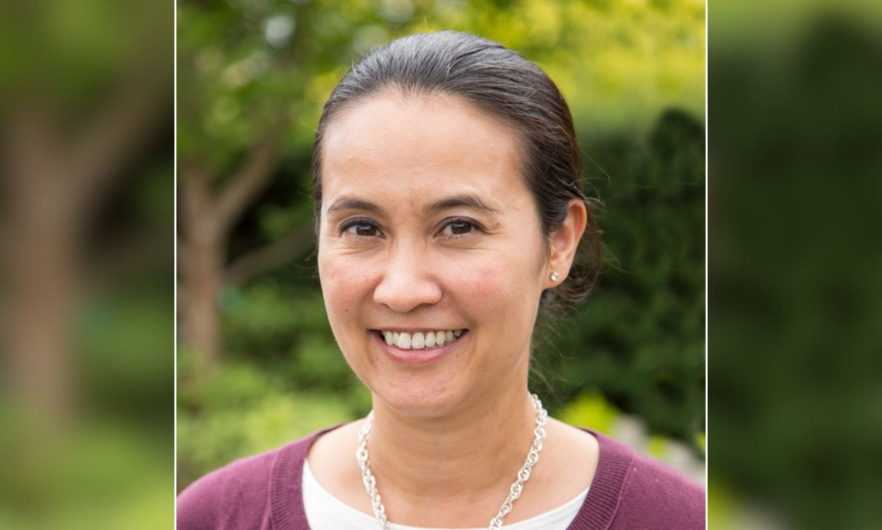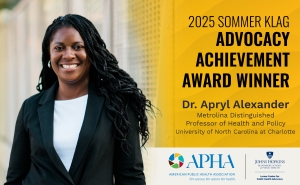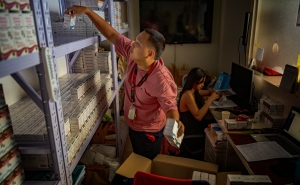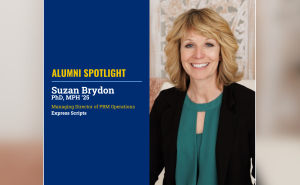Alumni Spotlight: Bianca Frogner, PhD, Guides Next Generation of Public Health Leaders
From public health student to public health education leader

When Bianca Frogner, PhD ’08, arrived at Johns Hopkins in 2003, she already had a sense that public health was where she wanted to make an impact.
“I had a biology background, thinking I’d go to medical school,” she said. “But after interning in Senator Ted Kennedy’s office my senior year of college, I saw a different path. I watched health experts walk into the room and speak directly to staffers shaping policy. That’s when I realized I wanted to be one of those people.”
That formative experience led her to what is now the Johns Hopkins Bloomberg School of Public Health, where she would eventually graduate with a PhD in Health Policy and Management and a concentration in Health Economics, later going on to become a national expert in health workforce research and policy. Today, she serves as the interim chair and professor in the Department of Family Medicine at the University of Washington (UW) School of Medicine while continuing her role as director of the UW Center for Health Workforce Studies.
But the road from doctoral student to department chair was not without its challenges.
“What I found at Hopkins was that people were willing to give me a shot. I didn’t come in with a traditional background in health economics, but people like Jerry and David Salkever saw my potential. That spirit of generosity—that belief in giving people a chance—is something I’ve carried with me.”
-Bianca Frogner, PhD '08
“One of the most important things I learned in my PhD program was perseverance,” Frogner said. “There are a lot of failures that come with being in academia, and I had one pretty big one right away: I failed my qualifying exam.”
Rather than let the failure derail her, Frogner leaned into the community around her.
“KD Frick dedicated time to prepare me for the retake. And Jerry Anderson gave me chance after chance to write and publish with him. The red lines were tough, but I knew they were helping me get better,” she said.
That mentorship had a lasting impact. “What I found at Hopkins was that people were willing to give me a shot. I didn’t come in with a traditional background in health economics, but people like Jerry and David Salkever saw my potential. That spirit of generosity—that belief in giving people a chance—is something I’ve carried with me.”
During her time at HPM, Frogner immersed herself in policy-relevant research. Her dissertation focused on international health spending comparisons: a topic close to her heart as the daughter of immigrants from Japan and Norway, two countries that often outperform the U.S. in both cost and outcomes.
That work positioned her to pursue a postdoctoral fellowship at the University of Illinois Chicago before moving to George Washington University as an assistant professor. Ten years ago, she landed at the University of Washington to direct the Center for Health Workforce Studies, where she continues to lead national research on health workforce trends, equity, and policy.
She now sits on Washington State’s Health Care Cost Transparency Board, where she helps guide spending benchmarks for the state—an echo of the early opportunities she had at Hopkins to sit in on high-level CMS spending projection meetings.
Frogner believes that her time at the department of health policy and management not only provided rigorous training but also helped her find her people.
“Those moments of being in the room where policy conversations happen—those were pivotal,” she said. “They gave me a window into what it meant to bring research into the policy world.”
Frogner believes that her time at HPM not only provided rigorous training but also helped her find her people.
“My cohort was incredible,” she said. “Two of my classmates were bridesmaids at my wedding ten years later. We keep in touch. That community and those relationships really sustained me.”
Now in a leadership role, she’s reflecting on what guidance she can pass along to today’s students.
“Remember your ‘why.’ That’s what will keep you going,” she said. “Public health is challenging and is constantly underfunded and underappreciated. But it still matters. Health and health care still matter even in these tough times. And there are people around you who want you to succeed, but they won’t know how to help unless you show them where you’re struggling.” She also emphasizes the importance of vulnerability and mentorship, not just for career advice, but for personal support.
"I cried in Jerry Anderson’s office so many times," she said, laughing. "He always had a box of tissues ready. He never made me feel bad or weak for crying; rather, he reminded me of how many had sat in that chair before me. And I try to be that kind of mentor now."
"Find mentors who give you a safe space to be real. They may not be in your exact field. They may even be your peers. But find the people who believe in you and surround yourself with them."
-Bianca Frogner, PhD '08
Her advice for the current students? "Find mentors who give you a safe space to be real. They may not be in your exact field. They may even be your peers. But find the people who believe in you and surround yourself with them."
And for those wondering whether they can really fit in public health, Frogner offers a little comfort:
“Most of us didn’t grow up knowing we wanted to go into public health. We found our way here because of a shared set of values. You’re already in a great community, so take advantage of that. Build relationships, ask for help, and keep your long game in mind.”
Frogner's career path embodies the rigor, policy engagement, and mentoring that form the HPM experience, culminating in national recognition as a health economist and then the head of a department.
"I didn’t take the straightest path," she said. "But thanks to the people who believed in me and the chances they gave me, I’ve ended up exactly where I want to be."





